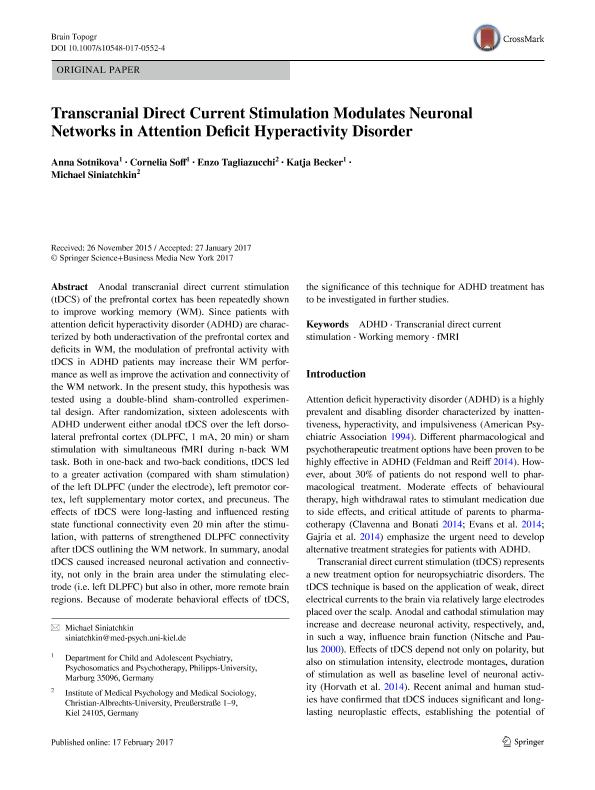Mostrar el registro sencillo del ítem
dc.contributor.author
Sotnikova, Anna
dc.contributor.author
Soff, Cornelia
dc.contributor.author
Tagliazucchi, Enzo Rodolfo

dc.contributor.author
Becker, Katja
dc.contributor.author
Siniatchkin, Michael
dc.date.available
2018-08-15T18:25:48Z
dc.date.issued
2017-09
dc.identifier.citation
Sotnikova, Anna; Soff, Cornelia; Tagliazucchi, Enzo Rodolfo; Becker, Katja; Siniatchkin, Michael; Transcranial Direct Current Stimulation Modulates Neuronal Networks in Attention Deficit Hyperactivity Disorder; Springer; Brain Topography; 30; 5; 9-2017; 656-672
dc.identifier.issn
0896-0267
dc.identifier.uri
http://hdl.handle.net/11336/55684
dc.description.abstract
Anodal transcranial direct current stimulation (tDCS) of the prefrontal cortex has been repeatedly shown to improve working memory (WM). Since patients with attention deficit hyperactivity disorder (ADHD) are characterized by both underactivation of the prefrontal cortex and deficits in WM, the modulation of prefrontal activity with tDCS in ADHD patients may increase their WM performance as well as improve the activation and connectivity of the WM network. In the present study, this hypothesis was tested using a double-blind sham-controlled experimental design. After randomization, sixteen adolescents with ADHD underwent either anodal tDCS over the left dorsolateral prefrontal cortex (DLPFC, 1 mA, 20 min) or sham stimulation with simultaneous fMRI during n-back WM task. Both in one-back and two-back conditions, tDCS led to a greater activation (compared with sham stimulation) of the left DLPFC (under the electrode), left premotor cortex, left supplementary motor cortex, and precuneus. The effects of tDCS were long-lasting and influenced resting state functional connectivity even 20 min after the stimulation, with patterns of strengthened DLPFC connectivity after tDCS outlining the WM network. In summary, anodal tDCS caused increased neuronal activation and connectivity, not only in the brain area under the stimulating electrode (i.e. left DLPFC) but also in other, more remote brain regions. Because of moderate behavioral effects of tDCS, the significance of this technique for ADHD treatment has to be investigated in further studies.
dc.format
application/pdf
dc.language.iso
eng
dc.publisher
Springer

dc.rights
info:eu-repo/semantics/openAccess
dc.rights.uri
https://creativecommons.org/licenses/by-nc-sa/2.5/ar/
dc.subject
Adhd
dc.subject
Fmri
dc.subject
Transcranial Direct Current Stimulation
dc.subject
Working Memory
dc.subject.classification
Astronomía

dc.subject.classification
Ciencias Físicas

dc.subject.classification
CIENCIAS NATURALES Y EXACTAS

dc.subject.classification
Otras Ciencias Biológicas

dc.subject.classification
Ciencias Biológicas

dc.subject.classification
CIENCIAS NATURALES Y EXACTAS

dc.title
Transcranial Direct Current Stimulation Modulates Neuronal Networks in Attention Deficit Hyperactivity Disorder
dc.type
info:eu-repo/semantics/article
dc.type
info:ar-repo/semantics/artículo
dc.type
info:eu-repo/semantics/publishedVersion
dc.date.updated
2018-08-10T17:47:27Z
dc.journal.volume
30
dc.journal.number
5
dc.journal.pagination
656-672
dc.journal.pais
Alemania

dc.journal.ciudad
Berlin
dc.description.fil
Fil: Sotnikova, Anna. Universitat Marburg; Alemania
dc.description.fil
Fil: Soff, Cornelia. Universitat Marburg; Alemania
dc.description.fil
Fil: Tagliazucchi, Enzo Rodolfo. Consejo Nacional de Investigaciones Científicas y Técnicas. Oficina de Coordinación Administrativa Ciudad Universitaria. Instituto de Física de Buenos Aires. Universidad de Buenos Aires. Facultad de Ciencias Exactas y Naturales. Instituto de Física de Buenos Aires; Argentina
dc.description.fil
Fil: Becker, Katja. Universitat Marburg; Alemania
dc.description.fil
Fil: Siniatchkin, Michael. Christian-albrechts-universitat Zu Kiel; Alemania
dc.journal.title
Brain Topography

dc.relation.alternativeid
info:eu-repo/semantics/altIdentifier/doi/http://dx.doi.org/10.1007/s10548-017-0552-4
Archivos asociados
